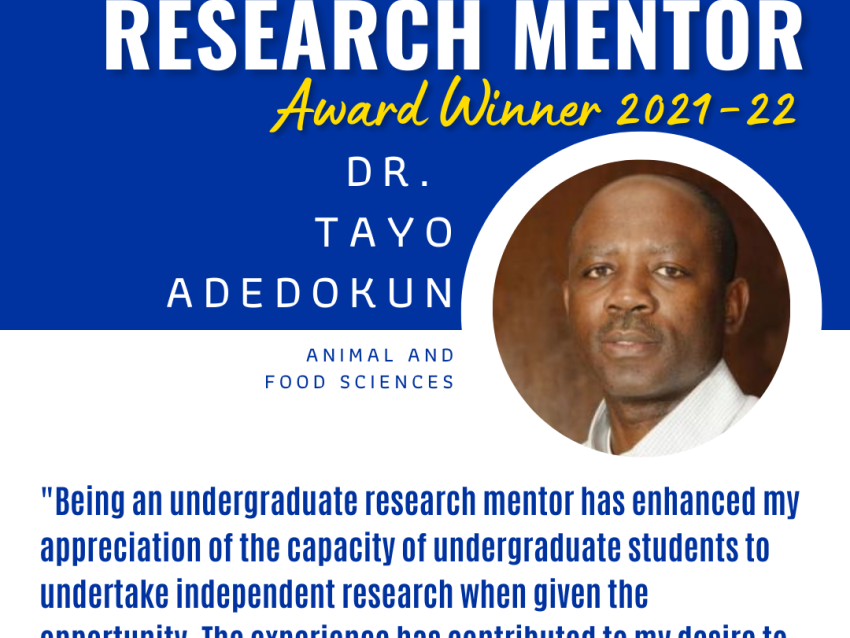
Tayo Adedokun Excellent Undergraduate Research Mentor of the Year 2021-22
Q. What does this award mean to you?
A. "I am grateful and honored to be one of the research mentors that were nominated by their mentees. I am also honored to share this award with three outstanding scholars and research mentors. To be nominated by my undergraduate research mentees for this award shows that they viewed the time spent in my lab as a rewarding and worthwhile learning experience. I feel happy and gratified by what they achieved during their research experience and I am motivated to continue to provide research opportunities to undergraduate students in the coming years."
Q. How has your experience as an undergraduate research mentor impacted you?
A. "Being an undergraduate research mentor has enhanced my appreciation of the capacity of undergraduate students to undertake independent research when given the opportunity. The experience has contributed to my desire to mentor more undergraduate students in the coming years."
Q. What is the most significant or memorable moment you have experienced as a mentor?
A. "I believe the most memorable moment I have experienced is when my undergraduate mentees are able to offer a meaningful critique of peer-reviewed studies. About four weeks after my mentees joined my lab, I asked them to review a peer-reviewed journal article and present it during a lab meeting. They were to discuss the purpose of the study, methodology, significant findings, what they would have done differently to improve the study, and why? Their presentation was very impressive, especially their ability to apply critical thinking skills to identify weaknesses in the study, what they would have done differently, and the rationale for their decisions. That experience showed me the depth of their understanding of scientific inquiry. Another memorable experience relates to their data processing, presentation, and interpretation skills. My approach to teaching data analysis is hands-on. I typically show and/or explain how to do the analysis and then provide students with the opportunity to work on the data on their own, after which I review and guide them through the entire process as necessary. I have always been impressed at the quality of my mentees’ work each time that I have presented them with this challenge. They put a lot of thought and effort into the process and I am always amazed to see joy on their faces as they make sense of the statistical relationships between treatments and the response variables. Both of them generated high-quality data that they will be presenting at the forthcoming national meeting of the Poultry Science Association this summer."
Q. Did you have an undergraduate research experience that inspired your own education and/or career?
A. "Yes, I did an undergraduate research that I found fulfilling. As an undergraduate student at Obafemi Awolowo University, Nigeria, I conducted poultry research for my honors thesis under the supervision of an amazing mentor, Professor Babafunso Sonaiya. The experience was one of the motivating factors for my decision to attend graduate school."
Q. How have undergraduate students been involved in your research?
A. "Since coming to UK, I have had the opportunity of having paid undergraduate student workers in my lab every semester. In addition to being “workers” in my lab, I used such opportunities to expose them to some details about any ongoing research in my lab. A couple of years ago, an undergraduate student completed a research work that motivated him to return to UK for his master’s in my lab."
Q. Why is undergraduate research important to the University of Kentucky?
A. "Why is undergraduate research important to the University of Kentucky?"
Q. "Undergraduate research is important to the University of Kentucky because it’s an avenue for preparing future researchers. Students who participate in undergraduate research experiences are more likely to attend graduate school or professional school and are more likely to aspire to research careers. I believe that undergraduate research experiences also give students unique opportunities to gain collaborative and team skills and other relational skills that may not be learned in the classroom."
Q. What advice would you give to a student considering undergraduate research?
A. "I would advise the student to look for such an opportunity, seize it, and run with it. I would also advise them not to allow the fear of having “too much work” to discourage them as most research mentors are flexible and willing to work with students’ schedules."